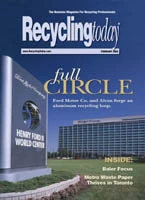FLAT HIGHWAY AHEAD
Highway spending is not likely to increase in 2003, according to a forecast from David Czechowski of the Portland Cement Association (PCA), Skokie, Ill. Czechowski gave his forecast to attendees of the C&D World conference in Fort Lauderdale, Fla., on Monday, Jan. 20.
"The sky is not falling; we just need to be prepared for this pause," Czechowski commented to C&D World attendees regarding a projected highway spending decrease of 0.2 percent in 2003.
Even if Congress approves a generous TEA-21 spending package, "some states may not be ready to pony up their share in 2003," the PCA economist remarked. Czechowski noted that most states are facing budget deficits, with severe cutbacks expected in several states.
Czechowski’s longer range forecasts have highway spending moving forward again in 2004, increasing by 5.7 percent in that year and by another 5.4 percent in 2005.
Several other construction segments are also expected to show slow or no growth in 2003. Residential construction growth has settled into a narrow annual growth range, according to the PCA’s forecasts. A 2.5 percent growth rate in 2002 will be followed by a flatter decline this year and 0.6 percent growth in 2004. Construction in the industrial and office segments has slowed noticeably.
Overall construction spending decreased by 1.3 percent in 2002 and is expected to fall another 1.5 percent in 2003, said Czechowski. A rebound is forecast for 2004, when overall spending is being forecast to grow by 2.3 percent.
The current lags on the economy include heavy loads of consumer debt, concern over lost portfolio values after the stock market spiral and the uncertain situation with Iraq. On the positive side, interest rates remain low and Americans continue to build and buy new homes and the durable goods that go into them. "The overall picture is fairly moderate," said Czechowski. "The recession we had in 2001 was fairly moderate by historical standards."
The C&D World conference, sponsored by the Construction Materials Recycling Association (CMRA), took place in Fort Lauderdale, Fla., Jan. 19-22.
HANDLED WITH CARE
The Carpet America Recovery Effort (CARE), Dalton, Ga., the industry-led effort to reduce the flow of waste carpet to landfills in the U.S., has announced its first grant cycle. CARE will be accepting grant proposals for programs that provide for the recycling or reuse of post-consumer carpet or increase the demand for products made from post-consumer carpet.
Individual grants up to $50,000 will be available to private sector applicants in each of three categories: Intermediate Processing and End-Use, Enhancement of the Collection Infrastructure and Research and Development of Markets.
Proposals will be evaluated based on the following criteria: waste stream impact; probability of program success planning/cost effectiveness; need; technology transfer (i.e. dissemination of information regarding project methodology and results); and sourcing and markets (i.e. source of waste carpet and destination markets).
The formal request for proposals (RFP) process will begin Feb. 1, 2003. Check the CARE Web site at www.carpetrecovery.org starting Feb. 4 to download RFP materials. The closing date is March 14, 2003.
The CARE Grants Committee will consider all applications, according to a news release from the group. The decision to award each grant will be consistent with CARE’s objective to divert carpet from landfill. Grant awards will be announced at CARE’s first annual meeting April 24-25, 2003, in San Destin, Fla.
For more information, check the CARE Web site at www.carpetrecovery.org.
JAPAN ZEROES IN ON C&D MATERIALS
The government of Japan—seeking to maximize landfill diversion in a nation short on landfill space—has targeted C&D materials as a recycling opportunity.
Sponsored Content
Labor that Works
With 25 years of experience, Leadpoint delivers cost-effective workforce solutions tailored to your needs. We handle the recruiting, hiring, training, and onboarding to deliver stable, productive, and safety-focused teams. Our commitment to safety and quality ensures peace of mind with a reliable workforce that helps you achieve your goals.
Waste from construction sites accounts for about 20 percent of total commercial sector waste (and 60 percent of what is dumped illegally), according to a report in Look Japan magazine.
These figures helped make C&D a point of emphasis in the Construction Recycling Act, which took effect in May of 2002. The act mandates the recycling of concrete, asphalt and lumber generated at construction and demolition sites.
As part of the act, contractors are required to prepare and file recycling plans with the Ministry of Land, Infrastructure and Transport (MOLIT).
Current markets for materials include the particleboard market for wood chips, as well as fuel generation and compost for scrap wood.
Realizing that adequate end markets will be necessary, MOLIT is calling for suggestions on uses for recycled construction materials.
Get curated news on YOUR industry.
Enter your email to receive our newsletters.

Explore the February 2003 Issue
Check out more from this issue and find your next story to read.
Latest from Recycling Today
- Denali now offers mobile depackaging service
- Hyundai confirms Louisiana as EAF mill site
- ASCE sees infrastructure progress, but more to be done
- Global steel output tapers downward
- NWRA announces 2025 Driver of the Year, Operator of the Year winners
- The Scrap Show: Nanci Schuld of FE Trading Group LLC
- Call2Recycle Canada partners with RLG to advance battery collection
- Report delves into recovery opportunities for food-grade polypropylene







